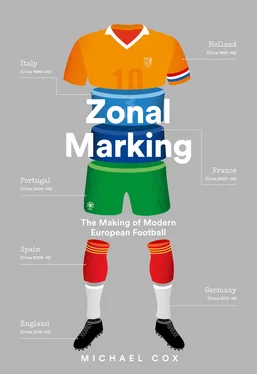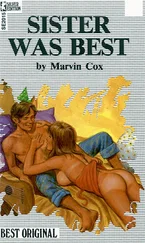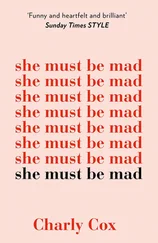In stark contrast, when Van Gaal was appointed Ajax manager in 1991 after several disappointing post-Cruyff managerial reigns, supporters were unhappy. Cruyff had been heavily linked with a return and Ajax fans chanted his name at Van Gaal’s early matches, while De Telegraaf , the Netherlands’ biggest-selling newspaper, led a campaign calling for Cruyff’s return. Some believed Van Gaal was merely a temporary solution until Cruyff’s homecoming was secured, so it would be understandable if Van Gaal harboured resentment towards him based on those rumours. In fact, the tensions had their origins two decades earlier.
Van Gaal was a relatively talented footballer, a tall and immobile player who started up front, more playmaker than goalscorer, and later dropped back into midfield. He enjoyed a decent career, primarily with Sparta Rotterdam, but considered his playing career something of a disappointment, mainly because he had expected to become an Ajax regular. He’d joined his hometown club in 1972 at the age of 20 and regularly appeared for the reserve side, but he failed to make a single first-team appearance before being sold. The player in his position, of course, was Cruyff, and therefore Van Gaal’s entire Ajax career was spent in Cruyff’s shadow: first as his understudy when a player, then unpopular second-choice as coach.
By the early 1990s Cruyff was Barcelona manager and Van Gaal was Ajax manager, and the two were not friends. ‘We have bad chemistry,’ Cruyff confirmed. Initially, as coaches, they’d been on good terms. In 1989, when Van Gaal was Ajax’s assistant coach, he studied at a coaching course in Barcelona over Christmas and spent many evenings at the Cruyff family home, getting along particularly well with Cruyff’s son Jordi, then a Barca youth player. This, however, is supposedly where things turned sour. Van Gaal received a phone call from the Netherlands, bringing the news that his sister was gravely ill, and he rushed back to Amsterdam to see her before she died. Much later, Van Gaal suggested Cruyff was angry with him for leaving without thanking the Cruyffs for their hospitality, something Cruyff strongly denies, claiming they had a friendly encounter shortly afterwards in Amsterdam. It seems implausible that Cruyff would use Van Gaal’s tragic news to start a feud, and more likely that there was a misunderstanding at a moment when Van Gaal was emotional. But the truth is probably much simpler: this was a clash of footballing philosophies, and a clash of egos.
Cruyff devoted a considerable amount of time to winding up Van Gaal, while increasingly becoming wound up himself. By 1992 journalists were inevitably comparing Cruyff’s Barcelona to Van Gaal’s Ajax, the European Cup winners and the European Cup Winners’ Cup winners respectively, which prompted a furious response from Cruyff. ‘If he thinks Ajax are much better than Barcelona, then he’s riding for a fall, he’s making a big mistake,’ he blasted. ‘When you look at Ajax at the moment, you can see the quality is declining.’ He became increasingly petty. In 1993 he said he wanted Feyenoord to win the league ahead of Van Gaal’s Ajax. In 1994, when asked which teams across Europe he admired, Cruyff replied with Auxerre and Parma – the two sides that had eliminated Ajax from European competition in the previous two seasons. In February 1995, when a journalist suggested that Ajax might be stronger than Barcelona, his response was blunt: ‘Why don’t you stop talking shit?’ But Van Gaal’s Ajax demonstrated their superiority by winning the Champions League that year.
Van Gaal eternally stressed the importance of collectivism: ‘Football is a team sport, and the members of the team are therefore dependent upon each other,’ he explained. ‘If certain players do not carry out their tasks properly on the pitch, then their colleagues will suffer. This means that each player has to carry out his basic tasks to the best of his ability.’ Simple stuff, but you wouldn’t find Cruyff speaking about football in such functional, joyless language. Cruyff wanted his players to express themselves, to enjoy themselves, but for Van Gaal it was about ‘carrying out basic tasks’. When Ajax failed to win, Van Gaal would typically complain that his players ‘did not keep to the arrangement’, effectively accusing them of breaking their teammates’ trust by doing their own thing. However, Van Gaal’s sides were not about grinding out results – they would play in an extremely attack-minded, if mechanical, way. ‘I suspect I’m fonder of playing the game well, rather than winning,’ he once said.
A fine example of Van Gaal’s dislike for individualism came in 1992, when he controversially sold the exciting winger Bryan Roy, which prompted criticism from Cruyff, who complained that his rival didn’t appreciate individual brilliance. Van Gaal’s reason was intriguing; he ditched Roy because ‘he did not mind running for the team, but he could not think for the team’. He was hardly the first autocratic manager to become frustrated with an inconsistent winger, but whereas others eschewed them entirely in favour of narrow systems, Ajax’s approach depended heavily on width, and Van Gaal needed two outright wingers.
Left-sided Marc Overmars and right-sided Finidi George were given strict instructions not to attempt dribbles past multiple opponents: in one-against-one situations they could beat their man, but if faced with two defenders they were told to turn inside and switch the play. Ajax supporters, accustomed to wingers providing unpredictability and excitement, were frustrated by their lack of freedom, as were the players themselves. Finidi eventually left for Real Betis, where he spoke of his delight at finally being able to express himself. Van Gaal, though, hated dribbling; not only did he consider it inefficient, he thought it was the ultimate example of a footballer playing for himself. ‘We live in a laissez-faire society,’ said Van Gaal. ‘But in a team, you need discipline.’
Van Gaal’s schoolmasterly approach was entirely natural considering he’d juggled his playing career with teaching for 12 years, following in the footsteps of his hero Michels, who was also a schoolteacher. Van Gaal was by all accounts a hard taskmaster who worked in a tough school with difficult pupils, often from poor backgrounds, and this shaped his managerial philosophy. ‘Players are really just like big children, so there really is a resemblance between being a teacher and being a coach,’ he said. ‘You approach students in a certain way, based on a particular philosophy, and you do so with football players in exactly the same manner. Both at school and in a football team you encounter a pecking order and different cultures.’ Before becoming Ajax’s first-team coach, Van Gaal took charge of the club’s youth system, where he coached an outstanding group featuring the likes of Edgar Davids, Clarence Seedorf and Patrick Kluivert. This, rather than managing a smaller Eredivisie club, served as his bridge between being a teacher and becoming a first-team coach. He enjoyed working with youngsters precisely because they were malleable; once a footballer was 25, Van Gaal believed, he could no longer change their identity. The only veterans in Ajax’s 1995 Champions League-winning side were defenders Danny Blind, in his ninth year at the club, and the returning Frank Rijkaard, who had initially risen through the club’s academy in the 1980s. Van Gaal wouldn’t have countenanced signing a fully formed, non-Ajax-schooled superstar, even if they were individually superior to an existing option. ‘I don’t need the eleven best,’ Van Gaal said. ‘I need the best eleven.’
Whereas Van Gaal was a teacher, Cruyff wasn’t even a student. He’d been appointed Ajax manager in 1985 despite lacking the requisite coaching badges: Cruyff was Cruyff, and so, as always, an exception was made. And whereas Van Gaal was highly suspicious of individuals, Cruyff was delighted to indulge superstars, and his Barcelona side featured far more individual brilliance in the final third because he could, at various stages, count on four of the most revered superstars of this era: Michael Laudrup, Hristo Stoichkov, Romario and Gheorghe Hagi. The rise and fall of Cruyff’s Barcelona depended largely on his treatment of these players.
Читать дальше












